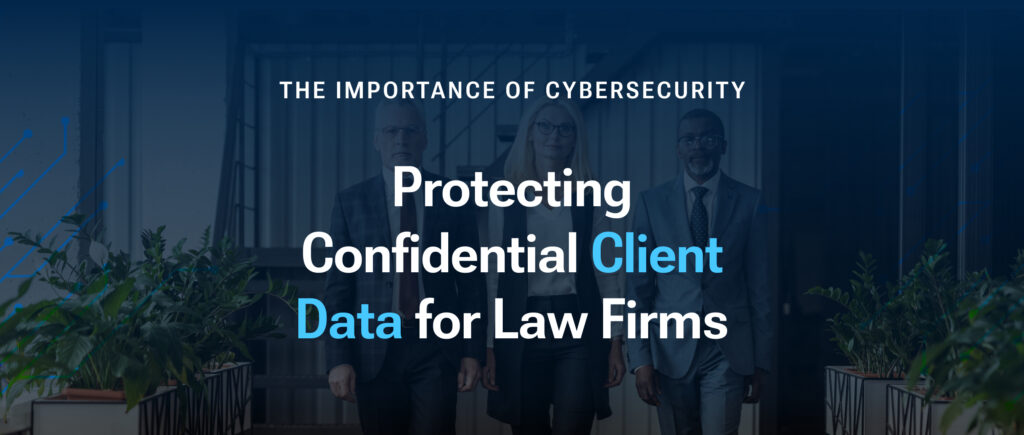In the legal industry, trust is everything. Law firms are entrusted with sensitive client information, from personal details to corporate secrets. With the rise of cybercrime, ensuring that this data is protected is no longer optional—cybersecurity is now a critical aspect of running a law firm. Data breaches, ransomware, and phishing attacks pose significant risks to law firms, and without proper security measures in place, the consequences can be catastrophic.
In this post, we will explore the importance of cybersecurity for law firms, the specific challenges they face, and how they can protect confidential client data from digital threats.
1. Why Cybersecurity for Law Firms is Crucial
Law firms handle vast amounts of highly confidential information, from legal documents and contracts to financial data and personal client details. As digital transformation takes hold of the legal sector, much of this information is now stored, processed, and communicated online. This shift has made law firms attractive targets for cybercriminals.
Cyberattacks on law firms can lead to:
- Data breaches: Sensitive client information can be stolen, leading to reputational damage and legal repercussions.
- Financial loss: Ransomware attacks and other forms of cybercrime can result in significant financial losses.
- Operational downtime: Disruptions caused by cyberattacks can halt a firm’s operations, affecting clients and ongoing cases.
With the rise of data protection regulations such as GDPR and HIPAA, law firms are also subject to legal penalties if they fail to protect client data adequately.
A comprehensive cybersecurity strategy is essential for ensuring that your firm is prepared to defend against these risks.
2. Common Cybersecurity Threats Facing Law Firms
Law firms face a variety of cybersecurity threats, many of which target the weakest links in the system. These include:
- Phishing attacks: Cybercriminals use deceptive emails to trick employees into revealing sensitive information or granting access to the firm’s systems.
- Ransomware: Hackers encrypt valuable data and demand a ransom in exchange for its release, often causing massive disruptions to operations.
- Insider threats: Employees or partners, either intentionally or unintentionally, can expose sensitive data through negligence or malicious actions.
- Data breaches: Hackers exploit vulnerabilities in the network to steal confidential client information.
For law firms in Oklahoma City, Edmond, and surrounding areas, having robust security measures in place is critical for mitigating these risks.
3. How Managed IT Services Protect Law Firms
One of the best ways for law firms to enhance their cybersecurity posture is by partnering with a managed IT service provider. Managed IT services offer comprehensive solutions tailored to the specific needs of law firms, helping them defend against cyber threats and protect sensitive client information.
A Managed IT Service provider can help law firms by:
- Managing networks to ensure secure communication between employees and clients.
- Offering computer help and server help to keep systems running smoothly and securely.
- Implementing backup data solutions to ensure that critical information is safely stored and easily recoverable in the event of a disaster or cyberattack.
- Enforcing network security measures, such as firewalls, encryption, and intrusion detection systems, to protect against unauthorized access.
For firms in Bethany, Midwest City, and The Village, local managed IT services provide a hands-on approach to cybersecurity, ensuring that potential threats are identified and addressed before they become significant problems.
4. The Role of Cloud Services in Cybersecurity
As more law firms move to cloud-based platforms for managing documents and client data, cloud security becomes an essential component of their cybersecurity strategy. Cloud services offer many benefits, including flexibility, scalability, and remote access, but they also introduce new risks if not properly secured.
By working with a Cloud Service provider, law firms can ensure that their cloud infrastructure is protected with advanced encryption, secure access controls, and regular security updates.
Benefits of cloud security for law firms:
- Secure data storage: Confidential client information is encrypted and stored in secure offsite locations, reducing the risk of physical theft or local system failures.
- Disaster recovery: Cloud services make it easy to back up data, ensuring quick recovery in the event of a cyberattack, hardware failure, or natural disaster.
- Access control: Advanced authentication and authorization protocols ensure that only authorized personnel have access to sensitive client information.
Law firms in Nichols Hills, Warr Acres, and Woodlawn Park can benefit from cloud-based security solutions that offer enhanced data protection without sacrificing convenience or productivity.
5. Developing a Long-Term IT Strategy for Cybersecurity
A robust cybersecurity plan requires more than just reactive measures. Law firms must engage in long-term IT planning to stay ahead of evolving threats. This is where a virtual CIO (Chief Information Officer) can play a pivotal role.
A virtual CIO provides strategic guidance, helping law firms develop and implement an IT roadmap that addresses both current and future cybersecurity needs. By regularly assessing the firm’s technology infrastructure, a virtual CIO can identify potential vulnerabilities and recommend solutions to mitigate them.
Some key elements of an effective cybersecurity strategy include:
- Regular security audits: Assessing systems and networks to identify potential weaknesses.
- Employee training: Ensuring that staff are aware of common cyber threats and how to avoid them, such as phishing scams.
- Backup and disaster recovery plans: Having systems in place to recover quickly from data breaches or cyberattacks.
Firms in Oklahoma City and Edmond can benefit from IT planning services that focus on long-term cybersecurity and operational resilience.
Conclusion: Protecting Your Law Firm with Cybersecurity
Cybersecurity is no longer optional for law firms—it is a necessity. With the sensitive nature of client data, the potential consequences of a breach are far-reaching, from financial penalties to loss of client trust. Law firms must take proactive steps to protect their data, and partnering with a managed IT service provider offers a comprehensive solution.
By investing in network security, cloud services, and IT planning, law firms can ensure that their confidential client information remains protected against the ever-growing landscape of cyber threats.
Ready to secure your law firm from digital threats? Contact Us to learn how we can help safeguard your firm’s data and reputation.
FAQs
1. Why is cybersecurity important for law firms?
Law firms handle sensitive client information that, if compromised, can lead to legal, financial, and reputational damage. Cybersecurity ensures that this data is protected from theft or unauthorized access.
2. How can managed IT services help law firms with cybersecurity?
Managed IT services provide comprehensive security solutions, including network management, data backups, and monitoring, to protect law firms from cyber threats.
3. What are the most common cyber threats to law firms?
The most common threats include phishing attacks, ransomware, insider threats, and data breaches, all of which target the sensitive information law firms store.
4. How can cloud services improve cybersecurity for law firms?
Cloud services offer encrypted data storage, secure access controls, and easy disaster recovery options, protecting client information from both cyber threats and physical damage.
5. How can law firms prepare for cybersecurity threats in the future?
By engaging in long-term IT planning and working with a virtual CIO, law firms can develop a strategic cybersecurity plan that adapts to evolving threats.
6. What cybersecurity services are available for law firms in Oklahoma City?
Law firms in Oklahoma City can benefit from Managed IT Services, offering tailored solutions to protect sensitive client data from cyber threats.
7. How can law firms in Bethany ensure their data is secure?
Law firms in Bethany can implement cloud services to store and back up client data securely, ensuring protection against breaches and data loss.
8. What IT planning services are available for law firms in Edmond?
Edmond-based law firms can benefit from IT planning services, ensuring long-term cybersecurity strategies are in place to protect their operations.
9. How can law firms in Nichols Hills protect client information?
Law firms in Nichols Hills can improve cybersecurity by implementing network security measures like firewalls, encryption, and secure remote access controls.
10. What role do managed IT services play in cybersecurity for law firms in Warr Acres?
Warr Acres law firms can rely on managed IT services for continuous network monitoring, ensuring that threats are identified and mitigated before they cause harm.
11. How do cloud services benefit law firms in The Village?
Law firms in The Village can use cloud services to store and protect sensitive data, providing redundancy and security in case of system failures or cyberattacks.
12. How can law firms in Woodlawn Park enhance their cybersecurity posture?
Law firms in Woodlawn Park can enhance their cybersecurity by working with a virtual CIO to develop a tailored IT strategy that includes network security, disaster recovery, and employee training.

